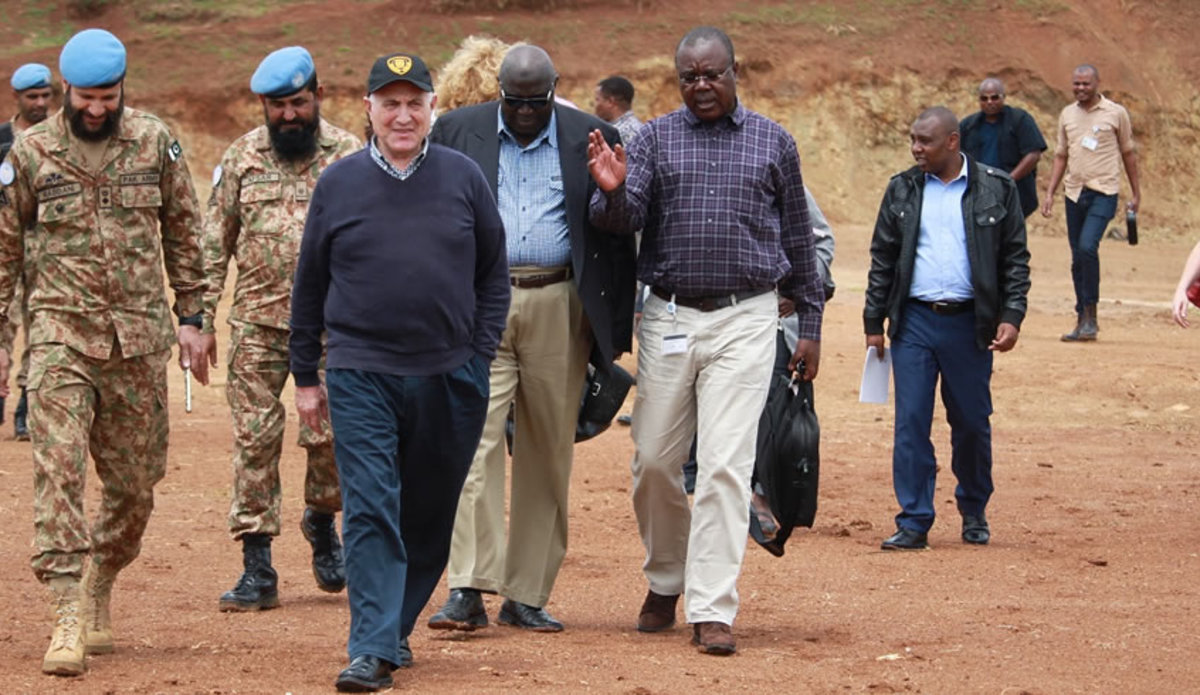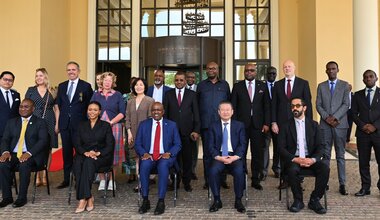Under the UN initiative, leaders of Africa’s Great Lakes region undertake a field visit to assess progress in the neutralization of negative forces in eastern DRC
Nairobi, 11 September 2017 – Under the leadership of the Office of the United Nations Special Envoy for the Great Lakes region, representatives of the signatory countries of the Peace, Security and Cooperation (PSC) Framework agreement, namely from the African Union (AU), the International Conference on the Great Lakes region (ICGLR) and the Southern African Development Community (SADC) undertook a field visit in eastern Democratic Republic of the Congo (DRC) to assess progress in the neutralization of negative forces in this region. The United Nations peacekeeping mission in the DRC (MONUSCO) provided logistical support for the visit, which also included Uganda.
For decades, illegal armed groups such as the Democratic Forces for the Liberation of Rwanda (FDLR), the Allied Democratic Forces (ADF) and the M23 have, at different periods of time, caused despair and contributed to the instability and lack of security in eastern DRC. Despite substantial progress in neutralizing these negative forces, eastern DRC remains largely in the hands of these armed groups that continue to perpetuate acts of violence and human rights abuses against civilian populations and are involved in the illicit exploitation of natural resources.
Furthermore, lack of progress in the implementation of the Nairobi Declarations and incursions of ex-M23 elements from Uganda into the DRC late last year and earlier this year remain a cause of concern as they fuel a climate of tension and mistrust between countries in the region. In addition, following renewed fighting in South Sudan in July 2016, hundreds of fighters of the Sudan People’s Liberation Movement/Army – In Opposition (SPLM/A-IO) and thousands of South Sudanese refugees crossed into eastern DRC, where their presence further threatens the country’s stability, thus worsening an already-fragile and unpredictable situation in eastern DRC.
In response to the above challenges, representatives of the ‘Guarantors’ of the PSC Framework, i.e., the UN, the AU, the ICGLR and SADC, have carried out a number of activities aiming to support ongoing efforts for the neutralization of negative forces. These include a series of consultations in Uganda, Rwanda and the DRC in April 2016 and a field visit to eastern DRC in May of the same year to engage stakeholders on ways to remove obstacles in the implementation of the Nairobi Declarations and the repatriation of the ex-M23 still present in Uganda and Rwanda, and to encourage the repatriation to Rwanda of disarmed FDLR elements present in the DRC.
Following the 17th meeting of the Technical Support Committee of the PSC Framework in Kenya on 4 May 2017, the members of the Committee agreed to undertake a second visit to eastern DRC in September this year to assess the situation on the ground and to make recommendations for the heads of state and government of the region. The Technical Support Committee is an advisory mechanism comprising senior government officials from the 13 signatory countries of the PSC Framework. It is expected to make recommendations to advance the implementation of the core objectives of the Framework which include the neutralization of armed groups; tackling the illegal exploitation of natural resources; addressing impunity and promoting judicial cooperation; finding durable solutions for refugees and IDPs; supporting Women and Youth empowerment; and promoting regional integration, economic development and governance.
The objectives of this year’s field visit were to assess progress and challenges in the neutralization of negative forces, as well as in the Disarmament, Demobilization, Repatriation, Reintegration and Resettlement (DDRRR) of foreign disarmed combatants; to strengthen ongoing initiatives on the neutralization of negative forces; and to accelerate the repatriation of former combatants, including the disarmed FDLR and the SPLM-IO located in eastern DRC, as well as the ex-M23 members that are still present in Rwanda and Uganda.
 UN
UN





